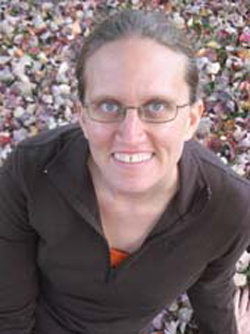Each issue of the Graduate Posts will profile one of our successful alumni, with the intent of revealing the broad scope of their backgrounds and activities, as well as the wide range of career paths available to our alumni. In this inaugural issue, we spotlight Jen Pluznick, a UNMC alumnus whose postdoctoral training was completed at Yale and who is currently a tenure-track faculty member at Johns Hopkins. Dr. Pluznick’s research has attracted the interest of the popular press (The Economist and the BBC). She also is active in the scientific community, serving on the Editorial Board of the American Journal of Physiology Renal Physiology and sitting on the Joint Program Committee of the American Physiological Society.
 |
Jennifer L. Pluznick, Ph.D. |
- Name: Jennifer L. Pluznick, Ph.D.
- Degree at UNMC: Ph.D. in cellular and integrative physiology, 2005
- Current Position: Assistant professor, department of physiology, Johns Hopkins School of Medicine
How did you become interested in physiology?
I’ve wanted to be a scientist since I was in elementary school, but narrowing in on a field of science was not easy. As an undergrad, I was a biology major. After the initial year of basic biology classes, each semester we would take a different higher-level science course: one semester was genetics, one was cell biology, etc. My college roommates had a running joke that my career aspirations changed each semester — when I took genetics, I was sure I wanted to be a geneticist. When I took ecology, I was convinced that I was meant to be an ecologist. I like to joke (although it’s also true) that physiology was the last class in the series, and thus sealed my fate. Beyond that, though, I liked the idea of doing research in an area that could impact human health.
What research are you currently doing?
My lab works on the general idea that sensory receptors (olfactory receptors, taste receptors, and other sensory GPCRs) play roles as chemoreceptors in non-sensory tissues — particularly, the kidney (and to some extent, the cardiovascular system). It turns out that this is a general theme that has been shown for many other organs. If you think of “taste” or “smell” receptors in these other organs, it may initially sound strange, but that’s really just because of the terminology. If you think of “well-developed chemosensors” in various organs or tissues, it can make a lot of sense. There are a lot of reasons why the kidney, in its efforts to maintain homeostasis on so many different fronts, might need to keep track of a variety of chemical molecules. My lab is trying to understand, for each individual receptor in the kidney, where the receptor is found, what it is sensing, and ultimately what its role is in physiology.
Click here for a video on Dr. Pluznick’s research.
What is your best memory of your time at UNMC?
My best memory is graduation — there are many small and important milestones in graduate school, but graduation is the culmination of all of that. Having family and friends there to share it with you makes it extra special.
What instructor or mentor at UNMC impacted you the most?
This would have to be a tie between my primary mentor, Steven C. Sansom, Ph.D., and a member of my committee (and director of the graduate program), Pamela K. Carmines, Ph.D. Pam’s lab was right next to Steve’s lab for most of my graduate studies, and both labs worked on the kidney. I learned a lot of basic physiology principles from Steve that I still use in my research now, and I remember Pam always being willing to help me out as well — when Steve was out-of-town, I would go to her routinely with any experimental problems. In addition, Steve and Pam have very different personality strengths, and I was able to learn from both of them – for example, Pam has an incredible innate sense of organization and attention to detail (it was she who made sure I moved that comma in my dissertation before it was finalized), and although Steve has many strengths, an innate drive towards organization and detail is not among them! I was lucky to be able to learn from both of them.
When you left UNMC, what were your goals? Have they changed?
When I left UNMC, my initial academic goal was just to survive my postdoc. Ultimately, my goal was to do good science, explore new areas of research, and obtain an independent faculty position.
You are an accomplished violinist. Do you still find time to play or perform?
I am by no means an “accomplished violinist” (or an accomplished anything else), but I do enjoy playing. The medical school here has a fledging Medical School Symphony Orchestra, and I’ve enjoyed getting to play with them.
Three things people don’t know about you are:
- I grew up in California.
- I’m an only child.
- I may be chemically addicted to Diet Coke.